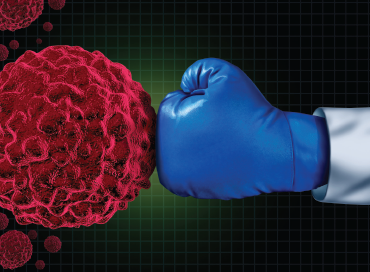
Lightspring / shutterstock.com
Since they were first introduced in 2011, immune checkpoint inhibitors (ICIs) have become an important treatment for an expanding list of advanced cancers. Some concerns have been raised around the mechanism of action of these immunotherapy agents, making their use in rheumatic diseases (RD) problematical. An article in the March 2018 issue of Arthritis & Rheumatology takes an initial look at the risk of flare or other adverse effects in this population.1
“ICIs work differently from chemotherapies that may deplete not only cancer cells, but also healthy ones,” says Uma Thanarajasingam, MD, PhD, an assistant professor of medicine within the Division of Rheumatology at the Mayo Clinic in Rochester, Minn. “ICIs target specific molecules that essentially act as brakes for the immune system, allowing the body to more efficiently attack the cancer cells.”
ICI Mechanism of Action Implicated in Autoimmune Disease
The problem arises because ICIs work in a nonspecific way. They inhibit the actions of CTLA-4, PD-1 and its ligands, which have been implicated in autoimmune diseases. Because of this, and the possibility of triggering flares or new disease activity in patients, people with RD were largely excluded from clinical trials. What happens when rheumatology patients receive ICIs remains unknown, thus physicians are hesitant to offer this effective immunotherapy to those with rheumatic diseases.
“I realized that a lot of our patients with RD at baseline were not included in the trials leading up to approval,” says Dr. Thanarajasingam. “Our patients also develop cancers, and we, of course, want them to be able to access potentially life-saving medications when possible.”
Study Enters 16 Patients
Dr. Thanarajasingam and colleagues performed a retrospective study to identify all patients at the Mayo Clinic who had received ICI therapy between 2011 and 2016. They identified about 700 people and using specific diagnostic codes, those with preexisting rheumatic disease were identified.

Dr. Thanarajasingam
Sixteen patients were entered into the review. Of these, 81% were female, with an average age of 68.3 years. The most common diseases were rheumatoid arthritis and polymyalgia rheumatica (five people each) followed by systemic lupus erythematosus and Sjögren’s syndrome (two people each).
Ten patients had previously been treated with a disease-modifying anti-rheumatic drug (DMARD) and two were still taking them at the time ICIs were initiated. Three more patients had already been prescribed glucocorticoids when the cancer treatment was started.
The primary malignancies were melanoma (n=10), pulmonary (n=2) and hematologic (n=2). Fifteen patients (94%) had metastatic or stage IV cancers, and one was diagnosed with stage II non-Hodgkin’s lymphoma. ICIs were offered only following the failure of several chemotherapies.
“RD patients already have an overactive immune system that is attacking the body,” says Dr. Thanarajasingam. “Because of how the ICIs work, the immunologic concern for those with RD was, would [the ICIs] cause their diseases to go wild?”
ICIs Can Induce Autoimmune Side Effects
Immunotherapy can induce autoimmune side effects in almost any organ system in the body. In this context, they are collectively called immune-related adverse effects (IRAE). Six patients had IRAEs, with colitis being the most common (n=3). Only a single patient presented with a flare of their RD. Everyone was treated successfully with glucocorticoids and stopping the ICI. No patients in the cohort were rechallenged with the same immunotherapy medication, and only one was switched to an alternate ICI.
“This study adds further support to the emerging notion that the rate of IRAEs is not necessarily higher in this group compared to the general population,” wrote Dr. Thanarajasingam in the A&R article. “Of our cohort of 16 patients, only six (38%) had an IRAE or flare of their rheumatic disease. Of these events, two were graded as mild, and all six patients responded well to glucocorticoids.”
In addition, the researchers found no associations between DMARD use before or after the cancer therapy and the risk of developing adverse effects. Those who experienced IREAs tended to survive longer than those who did not (median survival 17 months vs. 1.4 months respectively; P=0.003). They were, however, unable to assess the impact of RD activity on either survival or the risk for IREA development. This is related to a small number of people in the cohort and the heterogeneity of their treatments and underlying malignancy.
“What we saw in most of these patients is that their rheumatic diseases were relatively quiet,” she says. “They were on low doses of glucocorticoids, and only a minority were on additional immunosuppression. This suggests to us that a patient whose RD is well controlled when the ICIs are needed for their cancer are probably those who fare the best.”
Limits Noted
Dr. Thanarajasingam notes that the study had some limitations that should be taken into account. Two important ones are its retrospective nature and small sample size. The size concerns can be explained by what is likely an under-reporting of IRAEs related to the reporting system not having the granularity needed to look for flares of rheumatic disease.
Another concern is a reluctance to expose those with autoimmune disease to ICIs. In this cohort, 94% of patients received immunotherapy for their cancers only after failing conventional chemotherapy regimens. This suggests that RD may be a factor in delaying immunotherapy treatments.
There is also worry about the generalizability of the results due to the advanced stages of cancer that were seen before immunotherapy was instituted. This may be another indication of delay because ICI treatments are being used more often as first-line agents for many advanced malignancies.
Further Research
Further research is needed. Dr. Thanarajasingam is following patients with preexisting RD and those who develop it following exposure to the inhibitors. She would like to know if there is any impact on the response of their cancer. There is also a need to answer questions about how to intervene during a flare to minimize the impact on cancer treatment.
“Because ICIs have shown such dramatic responses in advanced cancer, their use has been expanding to many different forms of cancer,” says Dr. Thanarajasingam. “I want physicians to not immediately exclude their RD patients from eligibility just because they have existing autoimmune disease. This study would support using immunotherapy in a select group who can be followed closely by both oncology and rheumatology.”
Kurt Ullman has been a freelance writer for more than 30 years and a contributing writer to The Rheumatologist for 10 years.
Reference
- Richter MD, Pinkston O, Kottschade LA, et al. Brief report: Cancer immunotherapy in patients with preexisting rheumatic disease: The Mayo Clinic experience. Arthritis Rheumatol. 2018 Mar;70(3):356–360.



